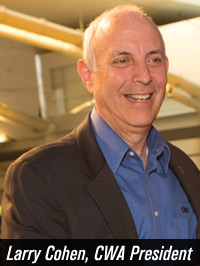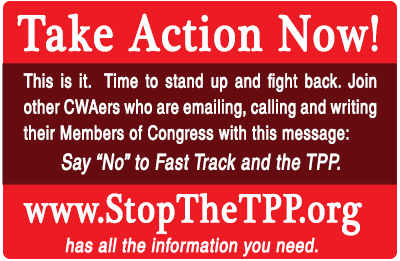Search News
For the Media
For media inquiries, call CWA Communications at 202-434-1168 or email comms@cwa-union.org. To read about CWA Members, Leadership or Industries, visit our About page.
Also in Spring 2015
- Notice Regarding Union Security Agreements and Agency Fee Objections
- There's so much to see at the new CWA/NETT Academy
- Fast Track is the Wrong Track
- The Fight to Stop Fast Track and the TPP!
- Big Money in Politics Gets Even Bigger
- Former Labor Secretary Robert Reich Takes on The Trans-Pacific Partnership
- Jobs Lost Due to NAFTA and China
Fast Track Fight: It's On

The next few weeks are “do or die” in the fight by CWA and more than 100 other organizations to stop “Fast Track” authorization for the Trans-Pacific Partnership trade deal.
It all comes down to this final push to contact our representatives in the House, encouraging them to vote “NO” on Fast Track for the TPP.
Fast Track means members of Congress must vote on the 1,200+ page TPP bill with almost no debate and no ability to amend it.
This is a trade deal that’s being negotiated almost completely in secret, among the U.S. and 11 countries including Vietnam, Malaysia, Singapore and Brunei. U.S. workers and communities deserve better than this trade deal that will disrupt communities, push more good jobs overseas and push down wages in the U.S. for any job that can be moved.
There’s a lot that’s wrong with the TPP and those issues are spotlighted in this issue of the News. You also can read more about what CWAers are doing to stop Fast Track now, and how you can join in.
More voices are being raised against the TPP deal. Former Labor Secretary Robert Reich is one of them. He was a supporter of NAFTA, but has come to see trade deals like the TPP for what they are: a giveway to the 1 percent and multinational corporations at the expense of the rest of us.
One issue that’s finally getting some media scrutiny is the special treatment the TPP trade deal gives to multinational corporations. In 20 years of trade deals, from NAFTA to the U.S.-Korea agreement, the enforcement of workers’ rights, and environmental and safety standards has basically been an afterthought.
That’s definitely not the case for big business. When a multinational corporation wants to enforce its rights under a trade deal, it sues in an international, secret tribunal. That process is called Investor State Dispute Settlement, and right now, there are 500 corporate claims pending under this process, for billions of dollars.
Compare this process to how labor and environmental complaints are handled. These complaints are handled through the U.S. government and drag on endlessly. The U.S. Trade Representative is the enforcer, and at the same time, the negotiator for new deals!
I have been involved in cases in Mexico, Colombia, Guatemala and most recently Honduras. The process takes years. And even when a report is finally written, there’s little likelihood that the issues will be effectively resolved by the violating country. The bottom line: corporations get to sue for billions of dollars in reparations. We get a report.
Nations around the world are dumping ISDS. Let’s put citizen rights on the same level as corporate rights. That’s a good start to the 21st century trade U.S. workers and communities deserve.
